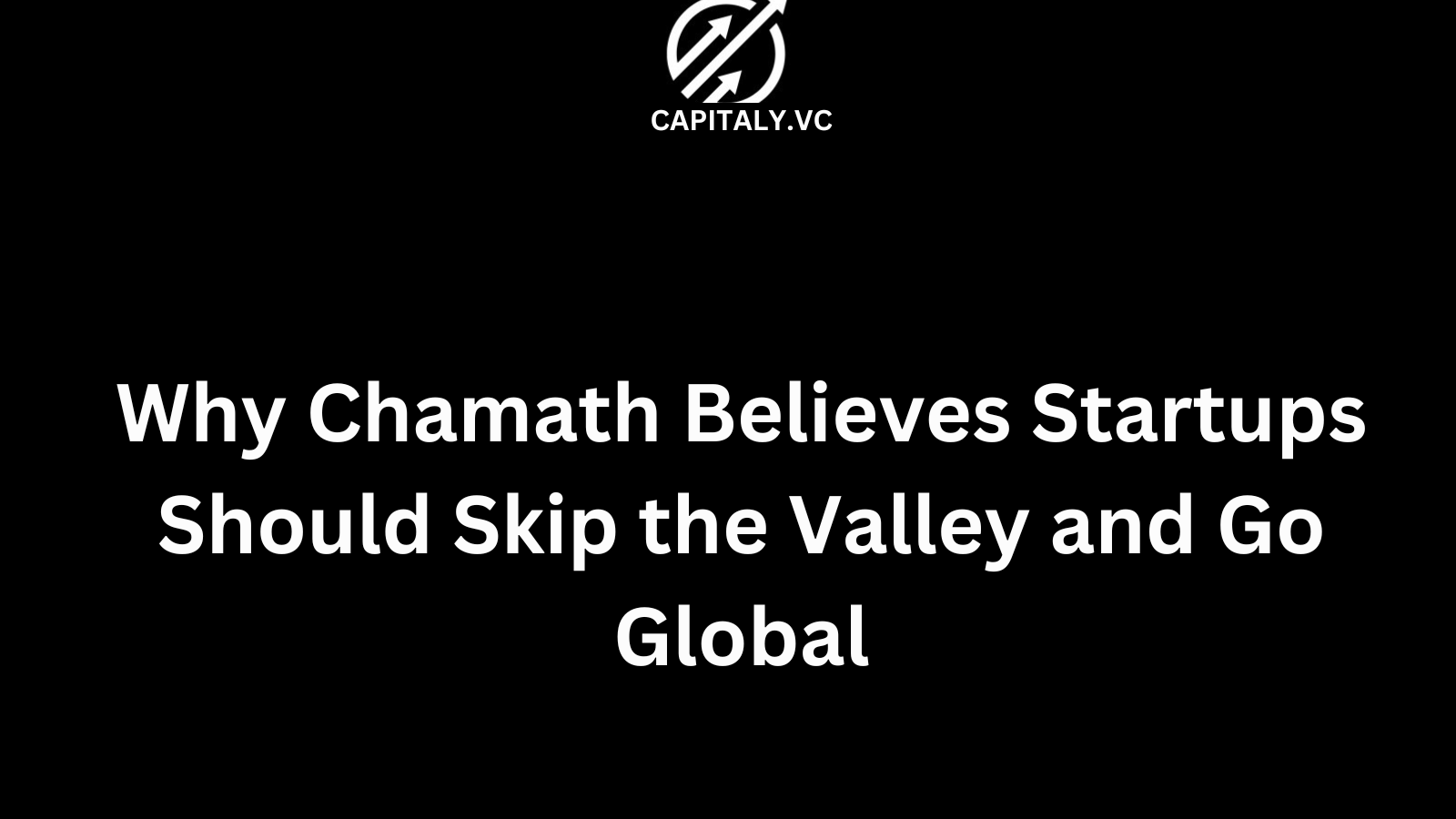Silicon Valley is no longer the only game in town.
According to Chamath Palihapitiya — former Facebook exec, billionaire investor, and Social Capital founder — the next generation of billion-dollar startups won’t be built in Palo Alto or San Francisco.
They’ll be built everywhere else.
In this blog, we’ll break down why Chamath is urging founders to skip the Valley, how globalization is changing startup dynamics, and what that means for fundraising, hiring, and exits.

1. Chamath’s Warning: Silicon Valley Has Lost the Plot
In multiple All-In Podcast episodes, Chamath has slammed what he calls the “Valley echo chamber.”
His critique?
- Too much groupthink
- Too many copycat SaaS ideas
- Sky-high burn rates and salaries
- VCs more focused on Twitter than tech
- Founders optimizing for clout over customers
“It’s become a culture of hype, not depth,” he said.
2. Why He Says “Go Global”
Chamath’s message to early-stage founders?
“You don’t need to be in the Valley to build a world-changing company.”
Here’s why:
- Distributed talent is now mainstream
- Remote fundraising works if you have traction
- Global markets are bigger than ever
- Regulatory arbitrage matters in crypto, AI, and biotech
- Valley costs make capital efficiency nearly impossible
3. He’s Not Just Talking — He’s Investing Accordingly
Through Social Capital and his personal portfolio, Chamath has backed:
- Fintech in India
- Biotech in Europe
- Crypto infra in Singapore
- Climate tech in Africa and LATAM
- AI R&D in Canada and Israel
He’s putting his capital where his thesis is — outside the bubble.
4. The New Global Startup Stack
Chamath argues the next iconic startups will use this blueprint:
- Built in: Bangalore, Lagos, Tel Aviv, Toronto, or Mexico City
- Incorporated in: Delaware or Singapore
- Selling to: US, EU, or global multinationals
- Backed by: distributed VCs and DAOs
- Hiring from: global, async-first teams
It’s not “Silicon Valley or bust” anymore.
5. What This Means for Founders
If you’re outside the Valley, this is your moment.
You can now:
- Raise from global investors on Zoom
- Hire ex-FAANG engineers in Eastern Europe or South America
- Target customers in the U.S. from anywhere
- Launch global products without moving to California
For practical help, see:
👉 How to Fundraise Globally Without Moving to the Bay
6. Counterpoint: Isn’t the Valley Still Powerful?
Of course — but Chamath’s point isn’t that the Valley is dead.
It’s that its monopoly on innovation is over.
The Bay Area still has:
- Top-tier VCs
- Experienced operators
- Exit opportunities
But you don’t need to be there 24/7/365 to benefit from them.
7. Chamath’s Favorite “Go Global” Sectors
Chamath is especially bullish on going global in:
- AI safety + agents (e.g., in the UK, Canada, Israel)
- Crypto infra (e.g., Switzerland, Singapore, Dubai)
- Climate tech (e.g., Africa, India, LATAM)
- Defense + dual-use tech (e.g., Israel, Australia)
- Biotech + health R&D (e.g., Europe, South Korea)
8. His Message to Valley VCs
Chamath has been blunt:
“If you're only looking within a 50-mile radius of Sand Hill Road, you’re already obsolete.”
He believes the best founders of the 2020s will:
- Be outsiders
- Be immigrants
- Be globally ambitious from Day 1
- Raise less and build more
9. The Capitaly Take: Global Is the New Default
At Capitaly, we agree.
That’s why we’re helping founders:
- Raise cross-border capital
- Tell global investor stories
- Navigate regulatory differences
- Build investor updates that scale across cultures and time zones
Global is no longer a strategy. It’s the starting point.
10. What Founders Should Do Right Now
If you’re outside Silicon Valley — good.
Now:
✅ Embrace local market advantages
✅ Build for global compliance (data, tax, talent)
✅ Tell a compelling remote-native fundraising story
✅ Use “global” as a strength, not an excuse
✅ Study other outsiders who won
Need help with your investor materials? Start here:
👉 The Ultimate Guide to Write a Winning Investor Memo
FAQs
1. Why does Chamath say to skip the Valley?
Because it's become bloated, hype-driven, and expensive — and innovation is happening globally.
2. Can you still raise money from Silicon Valley VCs while remote?
Yes — especially if you show traction and a compelling narrative.
3. What if I still want to move to the Valley?
You can — but don't assume it's a requirement. Many great companies today are built fully distributed.
4. What are the top countries Chamath is bullish on?
India, Israel, Canada, UAE, Singapore, Nigeria, and LATAM nations like Brazil and Mexico.
5. Does Chamath fund global founders?
Yes. Social Capital backs teams globally, especially those solving systemic problems.
6. What sectors work best globally right now?
AI, crypto, climate tech, healthtech, and defense.
7. What does “regulatory arbitrage” mean?
Choosing jurisdictions that are more innovation-friendly for crypto, AI, biotech, etc.
8. Is Delaware incorporation still standard?
Yes — many startups still use it for VC-friendliness, even if fully remote or global.
9. How can I meet global investors?
Via online demo days, Twitter, LinkedIn, founder communities like Capitaly, and warm intros.
10. Where can I get help crafting a global pitch?
Start here: Fundraising Is a Process, Not a Project
Conclusion
Chamath’s message is clear:
“If you're building something that matters, you don’t need a zip code — you need a mission.”
In a world where capital, talent, and ambition are borderless, founders who build globally from Day 1 will dominate the decade.
Subscribe to Capitaly.vc Substack (https://capitaly.substack.com/) to raise capital at the speed of AI.


.png)